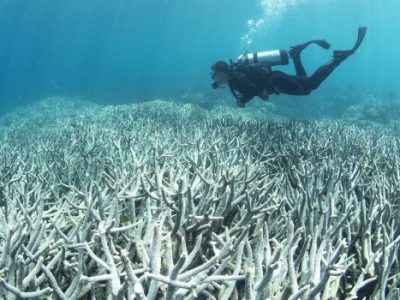CORAL DESPAIR

Coral despair (pc: afr.com)
Many of us watched the recent program on ABC TV hosted by David Attenborough on the Great Barrier Reef. A feeling of despair swept over me when I saw and heard once again eminent coral scientists such as Charlie Veron and Ove Hoegh-Guldberg on the future of the GBR. Their prognosis continues to be a wakeup call for all who have even the slightest concern for that incredible biologic feature of which we Australians serve as custodians.
I first met Charlie in 1973 when we took part in the Royal Society-University of Queensland Northern Great Barrier Reef Expedition. He was just beginning his great career documenting the taxonomy, biology and evolution of tropical corals. My task was to drill holes and try to decipher the late Quaternary history of some of the patch reefs in the Howick Group. Once that task was complete there was time to work with others on the expedition. This is how I became a temporary “bagman” for Charlie. He needed someone to dive with him to carry the bag for his underwater collection. It was a marvellous experience amongst the richness of reef biota that sadly we are losing. We were together in 1976 in London where we presented our findings to the Royal Society, later published in the Proceedings of that Society. He also assisted me in the identification of corals I found in NSW that were of Last Interglacial age, uranium series dated by John Marshall.
In 2008, Charlie published a very readable and powerful book entitled A Reef in Time, subtitled The Great Barrier Reef from Beginning to End. I encourage all to read it; what he said in 2008 remains even more relevant today. He discusses all those threats to the reef system that we have become so familiar with in recent years: such as bleaching, acidification, and nutrient runoff. Two quotes summarise his grave concerns: neither corals nor zooxanthellae will be able to evolve heat resistance in a time frame remotely commensurate with the projected rate of ocean temperature increase. But then he adds: there is even more serious danger from anthropogenic CO2 hovering in the background. Those reefs that escape mass bleaching will not have the same good fortune when ocean waters become acidified. These points are linked to the uncertain future facing the planet as a result of global warming.
There have been many reports this year of coral bleaching on the GBR. This has been especially prevalent in northern areas, regions less affected in the past by cyclonic storm damage and nutrient fluxes that stimulate algal and crown of thorns growth. The fact that reef areas in central and southern regions have been in decline in recent decades is one thing, but to observe adverse impacts of higher temperatures that drive symbiotic zooxanthellae from their coral homes at levels not apparent in the past in the more pristine northern regions is a real worry. As Charlie has stated, the GBR should “endure forever”. “That is what I once thought. But I think it no longer”. No wonder I could see despair on his face on the Attenborough show.
What to do? Here we face an enormous conundrum. Science is faced with challenges of experimenting with coral biology to find species that can adapt to hotter and more acid oceans—a huge and for some an impossible task in the time frame. We know that over geologic time corals can adapt to different conditions; one of the species I found near Newcastle was alive 130,000 years ago in warmer Last Interglacial waters, but today occurs in the vicinity of the Solomon Islands. But we can keep trying to experiment.
More critically are those attempts to mitigate climate change through emissions control. Australia must play its part in this global endeavour. But again do we have time for all the critical steps to enable nations to reach the necessary agreements and economic adjustments. I doubt it. Governments, state and federal, are trying to reduce more local stresses on the reef such as sediment and nutrient discharges from agricultural lands. But then there is the question of coal! So those feelings of hopelessness will remain. Unless our reefs are more resilient than we currently think, it is an enormous natural tragedy that humanity faces.
Words by Prof Bruce Thom. Please respect Bruce Thom’s thoughts and reference where appropriately: (c) ACS, 2016, posted 25th May 2016, for correspondence about this blog post please email admin@australiancoastalsociety.org.


 OFFSHORE SAND SOURCES
OFFSHORE SAND SOURCES